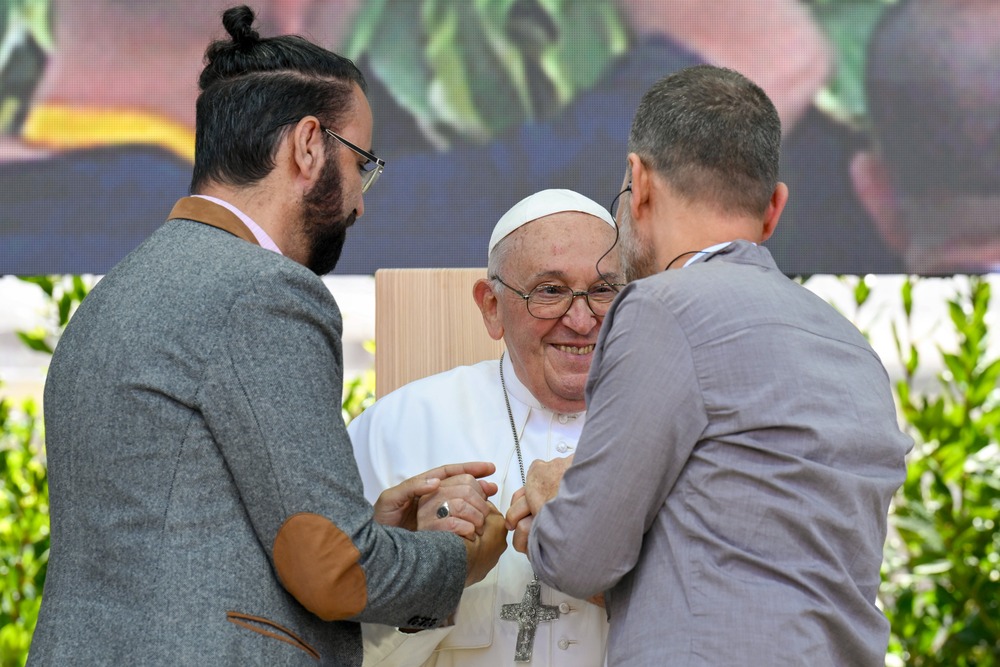
After embracing them, Pope Francis grasps the hands of Maoz Inon, right, an Israeli whose parents were killed Oct. 7 by Hamas militants, and Aziz Sarah, left, a Palestinian whose brother was killed by Israeli soldiers, during a meeting at the Arena in Verona May 18, 2024. (CNS/Vatican Media)
Celebrating the vigil of Pentecost in Verona, Pope Francis said the Holy Spirit sows peace by creating diversity, blessing it and harmonizing it for the good of all.
At the end of a full day in Verona May 18, the pope celebrated the vigil Mass with an estimated 32,000 people in the city's Bentegodi Stadium, giving a homily that was completely extemporaneous even though he held his prepared text in his hands.
One of the most beautiful things about the biblical description of Pentecost, he said, was how there were people there "from every nation, all languages and all cultures. And the Spirit, with all those people, builds the church."
"What does that mean? That he makes them all the same?" the pope asked rhetorically. "No, they are all different but with just one heart, with the love that unites us. The Holy Spirit is the one who saves us from the danger of making everyone the same."
"We are all redeemed, all loved by the Father, all taught by Jesus Christ, and the Spirit is the one that brings all of that together," Francis said.
"Friends, this is today's miracle," he said: The Holy Spirit takes people who are afraid and fills them with courage and takes people from every race and nation and makes harmony.
"The opposite of harmony is war," said the pope, who had presided earlier in the day over a meeting of popular movements and church groups committed to working for justice and peace.
The pope began his homily by saying many Catholics would not know how to respond if asked who the Holy Spirit is.
"One day, at a Pentecost Mass like this, with about 200 children, I asked, 'Who is the Holy Spirit?'" he said. Many of the children raised their hands to respond, and the little boy chosen to answer said, "'He's the paralytic' because he had heard someone say 'Paraclete'" and was confused.
"I'm not saying if I asked you, you would respond 'the paralytic,' but many of us don't know who the Holy Spirit is," Francis told the crowd.
Advertisement
"I'm not saying if I asked you, you would respond 'the paralytic,' but many of us don't know who the Holy Spirit is," Francis told the crowd.
And yet, he said, the Holy Spirit is the "protagonist" of the Christian life and is the person of the Trinity who helps people keep going in the face of trials, misunderstanding or even persecution.
"We all received the Holy Spirit at baptism and, even more, with confirmation," the pope said.
But people need to ask themselves, "Do I listen to the Holy Spirit who is inside me? Do I listen to the Spirit who moves my heart and says, 'Do this and don't do that?' Or does the Holy Spirit not exist for me?" he said.
Francis asked the crowd to think about the Pentecost scene recounted in the Bible with the Apostles gathered in the Upper Room and filled with fear. "And then the Holy Spirit came and changed their hearts, and they went out and preached the Gospel with courage."
"Courage," he repeated. "The Holy Spirit gives you the courage to live the Christian life."
The Spirit's gift of courage can help people change their lives, the pope said, recounting how people often confess the same sins over and over and tell the priest, "I wish I could change."
Pray to the Holy Spirit, he said. "Even if you have just one more day (to live), the Spirit can change your life, he can change your heart."
After the Mass, Francis returned to the Vatican by helicopter.
Meeting reporters later, Bishop Domenico Pompili of Verona said he and the pope were delayed getting to the stadium because after lunch at Verona's Montorio prison, the pope said to him, "Let's stop and say hello to your mother." So, they made a little detour to greet the woman, who recently celebrated her 90th birthday.
Crowds of Veronese and tourists lined the roads to the stadium, the bishop said, and people kept shouting, "Francesco" or "Francis."
"The power of this pope to communicate lies in the fact that he overcomes distances, wipes away boundaries, and people are attracted by his welcoming attitude," the bishop said. Calling out his name, "was not only a way to attract his attention but a sign that they value him."







